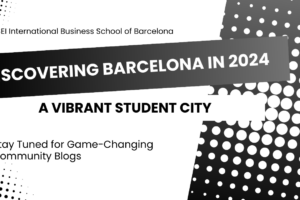
Unlocking the Power of Capstone Projects: What They Are and What You Can Gain from Them
- Categories International MBA, Academics, ESEI Community

The power of Capstone Projects
Capstone projects have become increasingly popular in recent years as a way for students to showcase their knowledge and skills in a real-world setting. In this blog, we’ll explore the power of capstone projects, its benefits and drawbacks, the outcomes you can gain from such a project, and the differences between a CP and a master’s thesis.
What is a CP?
A capstone project is a culminating experience that allows students to integrate the knowledge and skills they’ve learned throughout their academic program. Typically, they are completed during the final year of study and can take the form of a research paper, a creative project, a group project, or a combination of these.
Benefits of such Project
One of the main benefits of it is that it provides students with an opportunity to apply their knowledge and skills in a real-world setting. This type of project allows students to work on a project that has practical implications, giving them the chance to gain hands-on experience that can be valuable in their future careers.
Another benefit is that it can help students develop important skills such as research, critical thinking, problem-solving, communication, and teamwork. These skills are highly valued by employers and can help students stand out in a competitive job market.
Drawbacks of such Project
While capstone projects offer many benefits, they can also be challenging and time-consuming. Students must typically spend a significant amount of time researching and planning their projects, and they must also be able to effectively communicate their findings to an audience.
In addition, they may require a substantial amount of resources, such as funding, equipment, and personnel, which can be difficult to obtain, particularly for students who are working independently.
Outcomes of a Capstone Project
The outcomes can vary depending on the type of project and the goals of the student. Some students may use their capstone project as a launching point for their career, using the experience and knowledge gained during the project to secure a job or pursue further education.
Other students may use their CP as an opportunity to make a positive impact in their community or the world at large. For example, a student completing a capstone project focused on sustainability may develop a plan for reducing waste in their local community or for promoting renewable energy sources.
Difference Between a Capstone Project and a Master’s Thesis
While capstone projects and master’s theses share some similarities, there are also several key differences between the two.
A master’s thesis is typically a research-based project that focuses on a specific topic or question. The goal of a master’s thesis is to contribute new knowledge to the field and to demonstrate the student’s ability to conduct independent research.
In contrast, a CP is usually more focused on applying existing knowledge and skills to a real-world problem or issue. While a capstone project may involve some research, the primary focus is on practical application rather than contributing new knowledge to the field.
Additionally, a master’s thesis is usually completed by students pursuing a master’s degree, while capstone projects can be completed by students at various levels of education, including undergraduate and graduate students.
Conclusion
Capstone projects offer many benefits for students, including the opportunity to apply their knowledge and skills in a real-world setting and develop important skills that are highly valued by employers. However, capstone projects can also be challenging and time-consuming and may require a significant amount of resources.
While there are some similarities between capstone projects and master’s theses, there are also several key differences, including the focus on practical application in capstone projects and the emphasis on research and new knowledge in master’s theses. Regardless of the type of project, both can be valuable learning experiences for students and can help prepare
Explore Barcelona with ESEI International Business School of Barcelona
Previous post
Pursuing a Career in Sports Management: Why ESEI International Business School is the Best Choice
You may also like



